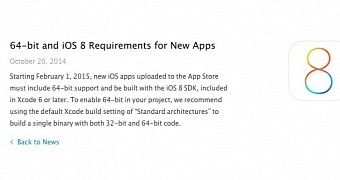A terse but very clear message directed at registered developers has been sent out this week from Cupertino: all app submissions from February 1 forth must support 64-bit architectures and iOS 8. No ifs or buts.
Apple is making it clear, albeit using very mild vocabulary, that it will no longer accept non-iOS 8 submissions starting early next year. The reasons are obvious: to reduce fragmentation in the ecosystem.
Apple’s message
The memo was posted on the News and Announcements area on Apple’s dev portal. It states that “Starting February 1, 2015, new iOS apps uploaded to the App Store must include 64-bit support and be built with the iOS 8 SDK, included in Xcode 6 or later.”
“To enable 64-bit in your project, we recommend using the default Xcode build setting of ‘Standard architectures’ to build a single binary with both 32-bit and 64-bit code,” the iPhone maker adds.
iOS 8 and Xcode 6 have been available to the general population since September, but longtime developers who renew their subscriptions with Apple annually have been testing these resources since summer. However, very few developers have been able to crank out native apps for Apple’s latest devices since their release. While most of the old apps still run fine on the newer devices and firmware versions, many of them display in a non-native format (i.e. blown-up, zoomed).
The reasons for Apple’s demands
Apple no longer wants apps to appear fuzzy, especially on the big display of the iPhone 6 Plus. To get developers to play ball, it has instated the aforementioned rules and will likely reject any apps that don’t comply past that deadline.
Another reason is fragmentation. The company seldom boasts that iOS is a very well established ecosystem where both the users and the developers are on par when it comes to what platform they’d rather be on. In Apple’s case, it’s usually the newest firmware. And since it puts all the necessary coding tools at the developers’ disposal, it’s only natural to demand them to support the latest iOS.
Finally, all new iDevices are 64-bit. In order for apps – old and new – to run smoothly on the newest hardware, they must support the A7, A7X, A8, and A8X processors natively. That doesn’t mean 32-bit is out. As noted in Apple’s memo, developers can build apps using “Standard architectures” and offer support across the board.

 14 DAY TRIAL //
14 DAY TRIAL //